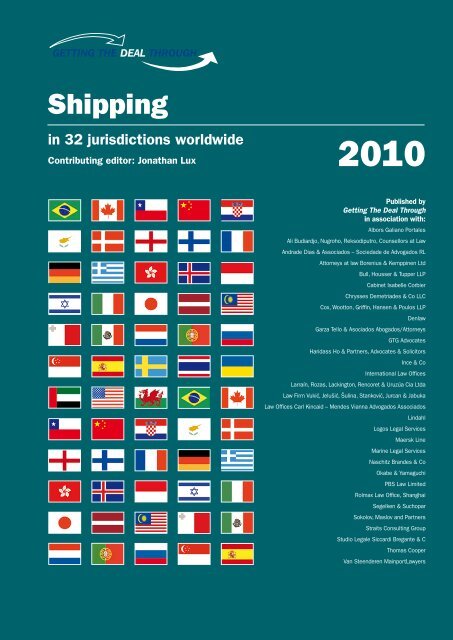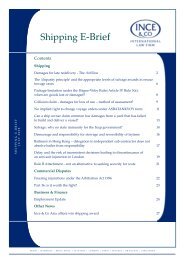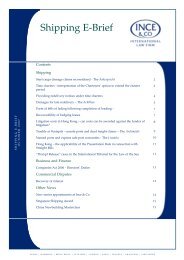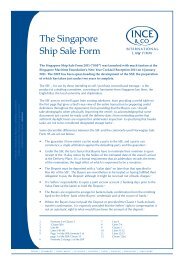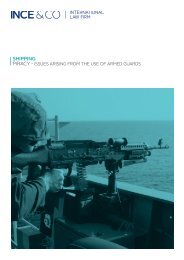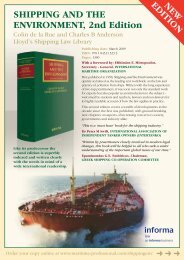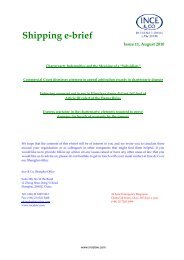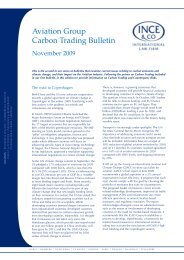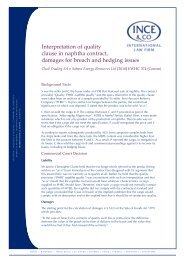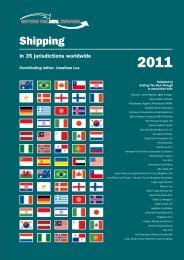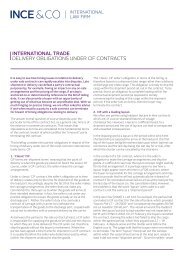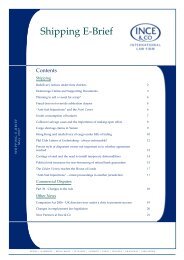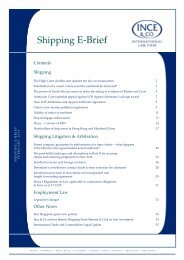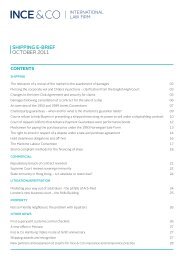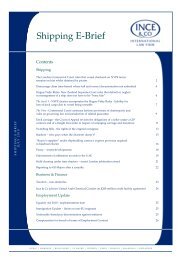Getting the Deal Through - United Arab Emirates - Ince & Co
Getting the Deal Through - United Arab Emirates - Ince & Co
Getting the Deal Through - United Arab Emirates - Ince & Co
- No tags were found...
You also want an ePaper? Increase the reach of your titles
YUMPU automatically turns print PDFs into web optimized ePapers that Google loves.
®Shippingin 32 jurisdictions worldwide<strong>Co</strong>ntributing editor: Jonathan Lux 2010Published by<strong>Getting</strong> The <strong>Deal</strong> <strong>Through</strong>in association with:Albors Galiano PortalesAli Budiardjo, Nugroho, Reksodiputro, <strong>Co</strong>unsellors at LawAndrade Dias & Associados – Sociedade de Advogados RLAttorneys at law Borenius & Kemppinen LtdBull, Housser & Tupper LLPCabinet Isabelle <strong>Co</strong>rbierChrysses Demetriades & <strong>Co</strong> LLC<strong>Co</strong>x, Wootton, Griffin, Hansen & Poulos LLPDenlawGarza Tello & Asociados Abogados/AttorneysGTG AdvocatesHaridass Ho & Partners, Advocates & Solicitors<strong>Ince</strong> & <strong>Co</strong>International Law OfficesLarraín, Rozas, Lackington, Rencoret & Uruzúa Cia LtdaLaw Firm Vukić, Jelušić, Šulina, Stanković, Jurcan & JabukaLaw Offices Carl Kincaid – Mendes Vianna Advogados AssociadosLindahlLogos Legal ServicesMaersk LineMarine Legal ServicesNaschitz Brandes & <strong>Co</strong>Okabe & YamaguchiPBS Law LimitedRolmax Law Office, ShanghaiSegelken & SuchoparSokolov, Maslov and PartnersStraits <strong>Co</strong>nsulting GroupStudio Legale Siccardi Bregante & CThomas <strong>Co</strong>operVan Steenderen MainportLawyers
contents®Shipping 2010<strong>Co</strong>ntributing editor:Jonathan Lux<strong>Ince</strong> & <strong>Co</strong>Business development managerJoseph SamuelMarketing managersAlan LeeDan BrennanGeorge IngledewEdward PerugiaRobyn He<strong>the</strong>ringtonDan WhiteTamzin MahmoudEllie NotleySubscriptions managerNadine RadcliffeSubscriptions@<strong>Getting</strong>The<strong>Deal</strong><strong>Through</strong>.comAssistant editorAdam MyersEditorial assistantNick Drummond-RoeSenior production editorJonathan <strong>Co</strong>wieChief subeditorJonathan AllenSenior subeditorKathryn SmulandSubeditorsAriana FramptonCharlotte StretchEditor-in-chiefCallum CampbellPublisherRichard DaveyShipping 2010Published byLaw Business Research Ltd87 Lancaster RoadLondon, W11 1QQ, UKTel: +44 20 7908 1188Fax: +44 20 7229 6910© Law Business Research Ltd2009No photocopying: copyrightlicences do not apply.ISSN 1759-0744The information provided in thispublication is general and may notapply in a specific situation. Legaladvice should always be sought beforetaking any legal action based on <strong>the</strong>information provided. This informationis not intended to create, nor doesreceipt of it constitute, a lawyer–clientrelationship. The publishers andauthors accept no responsibility forany acts or omissions containedherein. Although <strong>the</strong> informationprovided is accurate as of September2009, be advised that this is adeveloping area.Printed and distributed byEncompass Print SolutionsTel: 0870 897 3239Introduction Martin A Clausen Maersk Line 3Brazil Godofredo Mendes Vianna Law Offices Carl Kincaid – Mendes Vianna Advogados Associados 4Canada John W Bromley and Michael J Posnikoff Bull, Housser & Tupper LLP 12Chile Ricardo Rozas Larraín, Rozas, Lackington, Rencoret & Uruzúa Cia Ltda 18China Lu Min and Margot Luo Rolmax Law Office, Shanghai 27Croatia Gordan Stanković and Maja DotlićLaw Firm Vukić, Jelušić, Šulina, Stanković, Jurcan & Jabuka 33Cyprus Michael McBride, Yiannis Christodoulou and Michael PapadopoulosChrysses Demetriades & <strong>Co</strong> LLC 39Denmark Peter Schaumburg-Müller and Mathias Steinø Denlaw 45England & Wales Jonathan Lux with Reema Shour, Anna Fomina and Jams Rustambekov<strong>Ince</strong> & <strong>Co</strong> 51Finland Jan Aminoff and Inkeri Kuuskoski Attorneys at law Borenius & Kemppinen Ltd 60France Isabelle <strong>Co</strong>rbier Cabinet Isabelle <strong>Co</strong>rbier 66Germany Kathrin Janka Riehmer Segelken & Suchopar 72Greece Douglas Bateson and Ioanna Vitta Thomas <strong>Co</strong>oper 78Hong Kong Max Cross and Angela Yap <strong>Ince</strong> & <strong>Co</strong> 83Iceland Einar Baldvin Axelsson Logos Legal Services 92Indonesia M Husseyn Umar, Efendi H Manurung and Sahat A M SiahaanAli Budiardjo, Nugroho, Reksodiputro, <strong>Co</strong>unsellors at Law 99Israel Peter Gad Nashitz Naschitz Brandes & <strong>Co</strong> 104Italy Francesco Siccardi, Francesca Ronco and Enrica MonzaniStudio Legale Siccardi Bregante & C 108Japan Shuji Yamaguchi Okabe & Yamaguchi 117Latvia Edward Kuznetsov, Julia Kazmina and Diana Kalvane Marine Legal Services 122Malaysia Primila Edward Straits <strong>Co</strong>nsulting Group 127Malta Robert Tufigno and Cynthia van der Weerden GTG Advocates 132Mexico Fernando Escamilla and Anais Vivanco Garza Tello & Asociados Abogados/Attorneys 141Ne<strong>the</strong>rlands Arnold J van Steenderen, Marieke G van den Dool and Jasper R GroenVan Steenderen MainportLawyers 147Portugal Mateus Andrade Dias Andrade Dias & Associados – Sociedade de Advogados RL 156Russia Mikhail Sokolov, Anna Arkhipova and Sergey Seliverstov Sokolov, Maslov and Partners 166Singapore Ajaib Haridass, V Hariharan and Eddy TengHaridass Ho & Partners, Advocates & Solicitors 172Spain Eduardo Albors, Javier Portales and Alfonso de Ochoa Albors Galiano Portales 180Sweden Erik Linnarsson, Peter Bäverlid, Mark Hallquisth and Christoffer Gramming Lindahl 189Thailand Paiboon Sutuntivorakoon and Dennie Soong PBS Law Limited 196Ukraine Arthur Nitsevych and Nikolay Melnykov International Law Offices 203<strong>United</strong> <strong>Arab</strong> <strong>Emirates</strong> Bob Deering, Brian Boahene, Pavlo Samothrakis, Khalid Hamed,Mona Al Sayegh, Alexandra Bailey and Jacqueline McFadden <strong>Ince</strong> & <strong>Co</strong> 208<strong>United</strong> States Gregory W Poulos and Rupert P Hansen<strong>Co</strong>x, Wootton, Griffin, Hansen & Poulos LLP 214LawBusinessResearchwww.getting<strong>the</strong>dealthrough.com
<strong>United</strong> <strong>Arab</strong> <strong>Emirates</strong>ince & <strong>Co</strong><strong>United</strong> <strong>Arab</strong> <strong>Emirates</strong>Bob Deering, Brian Boahene, Pavlo Samothrakis, Khalid Hamed, Mona Al Sayegh,Alexandra Bailey and Jacqueline McFadden<strong>Ince</strong> & <strong>Co</strong>As a general caveat, please note that <strong>the</strong> UAE is a civil law jurisdiction.Case law does not follow any precedent system and each case isdetermined according to its own facts and arguments put forward.All references to articles are to articles in <strong>the</strong> UAE Maritime <strong>Co</strong>de(Federal Law No. 26 of 1981), unless expressly stated o<strong>the</strong>rwise.Newbuilding contracts1 When does title in <strong>the</strong> ship pass from <strong>the</strong> shipbuilder to <strong>the</strong>shipowner? Can <strong>the</strong> parties agree to change when title will pass?The general position under <strong>the</strong> UAE Maritime <strong>Co</strong>de is that title willpass upon <strong>the</strong> purchaser’s acceptance of delivery of <strong>the</strong> vessel after<strong>the</strong> vessel has undergone sea trials, per article 67 of <strong>the</strong> UAE Maritime<strong>Co</strong>de. The parties are, however, free to depart from this positionby providing for an alternative regime in <strong>the</strong>ir contract. Additionally,article 118 of <strong>the</strong> <strong>Co</strong>mmercial <strong>Co</strong>de, which applies more generally tocommercial activities (of which ship construction forms part), allowsa seller to retain title in moveable goods until <strong>the</strong> final instalment of<strong>the</strong> purchase price is paid.2 What formalities need to be complied with for <strong>the</strong> refund guarantee tobe valid?The UAE Maritime <strong>Co</strong>de provides that a shipbuilding contract mustbe in writing so to <strong>the</strong> extent <strong>the</strong> refund guarantee forms part of <strong>the</strong>ship building contract, it too must be in writing. It is not necessaryfor <strong>the</strong> guarantee to be notarised or registered. In practice, all shipbuildingcontracts and associated refund guarantees are evidenced inwriting and signed by <strong>the</strong> parties.3 Are <strong>the</strong>re any remedies available in local courts to compel delivery of<strong>the</strong> vessel when <strong>the</strong> yard refuses to do so?As a general point, <strong>the</strong>re is no form of mandatory injunctive reliefunder UAE law. Article 105 of <strong>the</strong> UAE <strong>Co</strong>mmercial <strong>Co</strong>de does howeverpermit a purchaser of goods to seek an order from <strong>the</strong> court akinto specific performance in <strong>the</strong> event <strong>the</strong> yard fails to make delivery of<strong>the</strong> goods after being served with notice by <strong>the</strong> purchaser. Article 105of <strong>the</strong> UAE Maritime <strong>Co</strong>de also allows <strong>the</strong> purchaser to claim, as analternative to seeking an order for delivery of <strong>the</strong> ship, cancellationof <strong>the</strong> contract and compensation.4 Where <strong>the</strong> vessel is defective and damage results, would a claim liein product liability against <strong>the</strong> shipbuilder at <strong>the</strong> suit of <strong>the</strong> shipowner;a purchaser from <strong>the</strong> original shipowner; or a third party that hassustained damage?Article 68 of <strong>the</strong> UAE Maritime <strong>Co</strong>de provides that where <strong>the</strong> purchasertakes delivery of a vessel after it has undertaken sea trials <strong>the</strong>yard is deemed to have guaranteed that <strong>the</strong> vessel is free from hiddendefects. However, <strong>the</strong> UAE <strong>Co</strong>mmercial <strong>Co</strong>de provides that incircumstances where <strong>the</strong>re is a hidden defect which is not material,this does not ordinarily entitle <strong>the</strong> purchaser to cancel <strong>the</strong> contract.Indeed, article 110 of <strong>the</strong> UAE Civil <strong>Co</strong>de provides that <strong>the</strong> purchasercan only avail a contract which concerns <strong>the</strong> acquisition of moveablegoods if <strong>the</strong> defect causes <strong>the</strong> goods to be unfit for <strong>the</strong>ir purpose ordifficulty in <strong>the</strong> disposal of those goods. Article 111 of <strong>the</strong> UAE Civil<strong>Co</strong>de goes on to provide for <strong>the</strong> purchaser to give notice of <strong>the</strong> defectsto <strong>the</strong> seller within 15 days of actual delivery, and requires <strong>the</strong> purchaserto commence proceedings to seek a reduction of <strong>the</strong> purchaseprice, on account of <strong>the</strong> defect, within 60 days from delivery unless<strong>the</strong> defect is latent, in which case <strong>the</strong> purchaser must file <strong>the</strong>ir claimwithin six months of actual delivery.Ship registration and mortgages5 What vessels are eligible for registration under <strong>the</strong> flag of yourcountry?Article 18 (1) UAE Maritime <strong>Co</strong>de provides that all vessels are eligiblefor registration under <strong>the</strong> UAE flag, excluding <strong>the</strong> following:• vessels designed for fishing, pleasure-cruising or used for commerce,and whose tonnage is not more than 10 tons;• lighters, pontoons, barges, tugs, boats, cranes, dredgers, divingvessels and o<strong>the</strong>r floating installations.These vessels may be registered at <strong>the</strong> request of <strong>the</strong> owners.6 What are <strong>the</strong> requirements for company formation?There are numerous corporate structures available in mainlandUAE as well as within <strong>the</strong> various free trade zones located within<strong>the</strong> UAE.The free zone located at <strong>the</strong> Jebel Ali Port is <strong>the</strong> oldest and probably<strong>the</strong> most popular free trade zone for maritime clients. Unlikemainland UAE, <strong>the</strong> Jebel Ali Free Zone Authority (JAFZA) allowsfor 100 per cent foreign ownership, which is often an attractivefeature for foreign investors. Mainland UAE continues to have foreignownership restrictions which for most corporate structures,broadly referred to as LLCs, requires 51 per cent ownership by aUAE national.The Dubai Maritime City (DMC) is a new option for <strong>the</strong> maritimeindustry, which aims to attract a range of maritime related entitiesinto one business community. The DMC is not itself a free tradezone but it may, on a case-by-case basis, permit investors to operateunder a JAFZA free trade licence within <strong>the</strong> DMC, which in turnallows for 100 per cent foreign ownership.The two key deciding questions an investor should considerwhen deciding on free zone or non-free zone would be:• if <strong>the</strong> prospective company will be trading within <strong>the</strong> UAE a freezone company will probably be inappropriate and an LLC willbe required; and• if <strong>the</strong> investor wants 100 per cent ownership of <strong>the</strong> corporate208 <strong>Getting</strong> <strong>the</strong> <strong>Deal</strong> <strong>Through</strong> – Shipping 2010
<strong>Ince</strong> & <strong>Co</strong>united arab emiratesentity an LLC will be inappropriate and a free zone companywill be required. There are albeit certain exceptions availableand in special circumstances, various consents and permits maybe granted which vary <strong>the</strong> standard position.Once <strong>the</strong> free zone decision has been made, <strong>the</strong> business structurewill ordinarily be determined by <strong>the</strong> business activities, <strong>the</strong> numberof shareholders and <strong>the</strong> types of licences <strong>the</strong> business requires.7 Is dual registration and flagging out possible and what is <strong>the</strong>procedure?Dual registration is not permitted under UAE law (article 28). Toregister a vessel, applicants must provide evidence that <strong>the</strong> vessel wasdeleted from any previous register.All vessels registered in accordance with <strong>the</strong> UAE Maritime <strong>Co</strong>deshall only fly <strong>the</strong> flag of <strong>the</strong> UAE (article 15). There is <strong>the</strong>refore, noprocedure for flagging out or dual registration.8 Who maintains <strong>the</strong> register of mortgages and what information does itcontain?Mortgages are recorded on <strong>the</strong> Ship Register which is maintained by<strong>the</strong> ship registrar in <strong>the</strong> office of <strong>the</strong> port where <strong>the</strong> vessel is registered.The data is also centrally available to <strong>the</strong> head UAE ship registrarin <strong>the</strong> UAE Marine Affairs Department, Ministry of Transport.If <strong>the</strong> vessel is outside <strong>the</strong> UAE <strong>the</strong> mortgage may also be recordedwith <strong>the</strong> UAE state consul. If <strong>the</strong> vessel is mortgaged while it is beingbuilt, <strong>the</strong> relevant place in which to record <strong>the</strong> mortgage would be<strong>the</strong> Registration Office of <strong>the</strong> port where <strong>the</strong> construction is takingplace.O<strong>the</strong>r than an official copy of <strong>the</strong> mortgage itself, <strong>the</strong> informationcontained on <strong>the</strong> Ship Register regarding <strong>the</strong> mortgage wouldinclude:• <strong>the</strong> name, nationality, place of residence and profession of <strong>the</strong>creditor and debtor;• date and type of contract;• amount of <strong>the</strong> debt;• any special conditions;• vessel’s name, description, date of manufacture and registrationnumber (and construction report, if mortgaged whilst being constructed);and• <strong>the</strong> place chosen by <strong>the</strong> creditor within <strong>the</strong> jurisdiction of RegistrationOffice where <strong>the</strong> entry is made.The UAE Ship Register is a closed register catering only for shipsowned by companies or individuals that are majority UAE-ownedand <strong>the</strong> information registered against each ship is not easily available.The relevant law relating to ship registration and mortgages isin articles 97-114 of <strong>the</strong> UAE Maritime <strong>Co</strong>de.Limitation of liability9 What limitation regime applies? What claims can be limited? Whichparties can limit <strong>the</strong>ir liability?The UAE ratified <strong>the</strong> 1976 Limitation of Liability <strong>Co</strong>nvention in1997 (LLMC 76). Although <strong>the</strong> UAE has ratified this conventionit has not yet repealed articles 138-142 <strong>the</strong> UAE Maritime <strong>Co</strong>de.Therefore doubt remains as to how any given judge would apply<strong>the</strong> law.Under <strong>the</strong> UAE Maritime <strong>Co</strong>de, translated article 138 statesthat a shipowner ‘may’ limit his liability in respect of <strong>the</strong> followingclaims:• <strong>the</strong> death or injury of any person on board <strong>the</strong> vessel and also<strong>the</strong> loss or damage of any property on board <strong>the</strong> vessel;• <strong>the</strong> death or injury of any o<strong>the</strong>r person on board or at sea and <strong>the</strong>loss or damage of any property or <strong>the</strong> infringement of any right ifthis results from <strong>the</strong> offence of any person for whom <strong>the</strong> owneris responsible whe<strong>the</strong>r or not such person is on board <strong>the</strong> vessel,provided that <strong>the</strong> offence is connected with navigation or <strong>the</strong>management, loading, transportation or unloading of <strong>the</strong> vesselor <strong>the</strong> embarkation, carriage or disembarkation of passengers;and• any obligation imposed by <strong>the</strong> law connected with <strong>the</strong> lifting ofshipwrecks or <strong>the</strong> refloating, lifting or demolition of a sunkenvessel or a vessel which has gone aground or been abandoned,including <strong>the</strong> contents aboard and any obligation arising fromdamage caused by <strong>the</strong> vessel to ports’ installations, docks andnavigation lanes.The ability to limit liability under this provision of UAE maritimelaw is <strong>the</strong>refore at <strong>the</strong> discretion of <strong>the</strong> court and is not an automaticentitlement. Local courts have traditionally been reluctant to permit<strong>the</strong> limitation of liability. For this article to be considered mandatoryit would need to be incorporated into <strong>the</strong> contract of carriage.Under <strong>the</strong> UAE Maritime <strong>Co</strong>de, shipowners, ship charterers and<strong>the</strong>ir personnel may limit <strong>the</strong>ir liability.10 What is <strong>the</strong> procedure for establishing limitation?Despite <strong>the</strong> ratification of LLMC 76 and contrary to article 141, <strong>the</strong>UAE courts do not usually permit shipowners to establish a limitationfund since <strong>the</strong>re is a general opposition to <strong>the</strong> concept of <strong>the</strong>limitation of liability as a whole. If <strong>the</strong> local court were to permit <strong>the</strong>setting up of a limitation fund, this would be calculated on a slidingscale dependent on vessel’s overall tonnage. A shipowner may <strong>the</strong>nlimit his liability without any evidence of an offence committed onhis part or on <strong>the</strong> part of <strong>the</strong> persons for whom he is responsible.Fur<strong>the</strong>rmore, if a shipowner chooses to limit his liability it will notbe considered an admission of liability.11 In what circumstances can <strong>the</strong> limit be broken?A shipowner may not limit his liability when an incident which hasgiven rise to liability is as a result of his personal error. Liabilitiesarising from aid and rescue and <strong>the</strong> sharing of joint losses (generalaverage) may not be limited and <strong>the</strong> limitation in respect of liabilitiestoward <strong>the</strong> shipowner’s crew or personnel or <strong>the</strong>ir heirs may not belimited. Additionally, claims arising from nuclear damage and madeagainst <strong>the</strong> owner of a nuclear vessel may not be limited.Port state control12 Which body is <strong>the</strong> port state control agency? Under what authoritydoes it operate?The Department of Maritime Inspection may carry out <strong>the</strong> controland inspection of national and foreign registered vessels (article58(1) and 59). It operates under <strong>the</strong> authority of <strong>the</strong> minister ofcommunications.13 What sanctions may <strong>the</strong> port state control inspector impose?Depending on <strong>the</strong> breaches, <strong>the</strong> Department of Maritime Inspectionmay impose <strong>the</strong> following sanctions:• a six-month imprisonment and/or a fine not exceeding 25,000<strong>United</strong> <strong>Arab</strong> <strong>Emirates</strong> Dirhams (article 64);• a one-month imprisonment and/or a fine not exceeding 5,000<strong>United</strong> <strong>Arab</strong> <strong>Emirates</strong> Dirhams (article 65);• issuing a decree refusing <strong>the</strong> granting of a seaworthiness licence,or a safety certificate (article 61(1)); or• issuing a decree prohibiting <strong>the</strong> vessel from sailing or cancellingsuch prohibition stating <strong>the</strong> reasons <strong>the</strong>reof (article 61(1)).www.getting<strong>the</strong>dealthrough.com 209
<strong>United</strong> <strong>Arab</strong> <strong>Emirates</strong>ince & <strong>Co</strong>14 What is <strong>the</strong> appeal process against detention orders or fines?An appeal may be lodged to <strong>the</strong> minister of communication withinten days of <strong>the</strong> sanctions being notified. The minister will rule on <strong>the</strong>appeal within 10 days of receiving <strong>the</strong> application (article 61(2)).Classification societies15 Which are <strong>the</strong> approved classification societies?AbbreviationABSBVCCSDNVGLLRRSKRNKRINANameAmerican Bureau of ShippingBureau VeritasChina Classification SocietyDet Norske VeritasGermanischer LloydLloyd’s Register of ShippingRussian Maritime Register of ShippingKorean Register of ShippingNippon Kaiji KyokaiRegistro Italiano Narate16 In what circumstances can a classification society be held liable, if atall?There is no known authority on this issue in UAE law. It is very difficultto anticipate how <strong>the</strong> UAE court would approach this issue.<strong>Co</strong>llision, salvage, wreck removal and pollution17 Can <strong>the</strong> state or local authority order wreck removal?Under UAE Maritime <strong>Co</strong>de, <strong>the</strong> appropriate maritime departmentmay confiscate <strong>the</strong> wreck of a vessel as security for <strong>the</strong> cost of itsremoval. In practice, if a wreck is located within port limits, <strong>the</strong> relevantport management authority will remove <strong>the</strong> wreck. No federalbody currently exists to cover <strong>the</strong> issue of wreck removal across allterritorial waters.18 Which international conventions or protocols are in force in relation tocollision, salvage and pollution?Whilst <strong>the</strong> 1910 <strong>Co</strong>llision <strong>Co</strong>nvention has never been formally ratifiedby <strong>the</strong> UAE, <strong>the</strong> current provisions contained within <strong>the</strong> UAEMaritime <strong>Co</strong>de are based on this. The UAE has also acceded to <strong>the</strong><strong>Co</strong>llision Regulations 1972. The <strong>Co</strong>llisions at Sea provisions applyto all collisions that occur between two vessels where <strong>the</strong> damagecaused results from a vessel’s act or omission or failure to observe<strong>the</strong> National Law or approved international maritime conventions,as applicable. The provisions stipulate that compensation for damageto a vessel or vessels involved in a collision shall be commensuratewith <strong>the</strong> actual damage caused.The International <strong>Co</strong>nvention on Salvage 1989 applies to <strong>the</strong>UAE and was given <strong>the</strong> force of law in 1993.The UAE is signatory to <strong>the</strong> International <strong>Co</strong>nvention for <strong>the</strong>Prevention of Pollution from Ships 1973 as amended by <strong>the</strong> <strong>the</strong> 1978Protocol (Marpol 73/78). It is also signatory to <strong>the</strong> International<strong>Co</strong>nvention on Civil Liability for Oil Pollution Damage 1992 (CLC1992) and <strong>the</strong> Fund <strong>Co</strong>nvention 1992.19 Is <strong>the</strong>re a mandatory local form of salvage agreement or is Lloyd’sstandard form of salvage agreement acceptable? Who may carry outsalvage operations?No mandatory form of salvage agreement currently exists in <strong>the</strong> UAEand since freedom of contract is widely acknowledged, any form ofagreement can be utilised (including LOF). Any ship may carry outsalvage operations.Ship arrest20 Which international convention regarding <strong>the</strong> arrest of ships is in forcein your jurisdiction?Nei<strong>the</strong>r of <strong>the</strong> conventions are officially in force in <strong>the</strong> UAE. However<strong>the</strong> UAE Maritime <strong>Co</strong>de does contain a section on ship arrestbased on <strong>the</strong> provisions of <strong>the</strong> 1952 convention.21 In respect of what claims can a vessel be arrested? In whatcircumstances may associated ships be arrested?The grounds of arrest which are largely based on <strong>the</strong> claims set outin Article 1 of <strong>the</strong> 1952 convention. The grounds of arrest under <strong>the</strong>UAE Maritime <strong>Co</strong>de, set out at article 115 include <strong>the</strong> followingclaims:• damage caused as a result of a collision;• death or personal injury;• salvage;• contractual claims;• loss or destruction of goods onboard <strong>the</strong> vessel;• general average;• towing or piloting;• building, repairing or supplying vessels and <strong>the</strong> costs ofdocking;• disbursements spent on account of <strong>the</strong> vessel or shipowner;• crew wages;• disputes over <strong>the</strong> vessel’s ownership;• disputes concerning joint ownership; and• marine mortgages.All of <strong>the</strong>se claims are referred to as ‘marine debts’. Article 116(1) inaddition permits <strong>the</strong> arrest of a sister ship owned by <strong>the</strong> debtor at <strong>the</strong>time <strong>the</strong> debt arose save that where <strong>the</strong> claim concerns disputes overownership, joint ownership and mortgages <strong>the</strong> arresting party is onlyentitled to arrest <strong>the</strong> vessel to which <strong>the</strong> debt refers. Mere associatedship arrests are not permitted under <strong>the</strong> UAE Maritime <strong>Co</strong>de.In <strong>the</strong>ory, at least, <strong>the</strong> UAE courts ought only to grant an arrestif it has jurisdiction on any of <strong>the</strong> following bases:• <strong>the</strong> arresting party’s usual address or office is in <strong>the</strong> UAE;• <strong>the</strong> marine debt originated in <strong>the</strong> UAE;• <strong>the</strong> marine debt arose during a voyage when <strong>the</strong> vessel wasarrested; or• <strong>the</strong> marine debt arose from collision of salvage where <strong>the</strong> relevantUAE court has jurisdiction to hear <strong>the</strong> claim or if <strong>the</strong> marine debtis secured by a mortgage against <strong>the</strong> vessel.In practice however <strong>the</strong> UAE courts have allowed vessels to bearrested in <strong>the</strong> UAE merely on <strong>the</strong> basis of <strong>the</strong> vessel’s presence inUAE waters.22 What is <strong>the</strong> test for wrongful arrest?In some <strong>Emirates</strong>, as a condition of granting an arrest, <strong>the</strong> court willrequire <strong>the</strong> arresting party to undertake to indemnify <strong>the</strong> respondentfor any loss or damage, within <strong>the</strong> claim amount, and to pay compensationto <strong>the</strong> court if a final judgment determines that <strong>the</strong> arrestwas wrongful. While this practice does exist, <strong>the</strong>re is little transparencyas to what constitutes grounds for a wrongful arrest but it isthought that something more than simple negligence is required.In addition to <strong>the</strong> indemnity undertaking <strong>the</strong> plaintiff must also,in certain <strong>Emirates</strong>, undertake to be responsible to <strong>the</strong> court for <strong>the</strong>costs and expenses of maintaining <strong>the</strong> vessel while it is under arrest.210 <strong>Getting</strong> <strong>the</strong> <strong>Deal</strong> <strong>Through</strong> – Shipping 2010
<strong>Ince</strong> & <strong>Co</strong>united arab emirates23 Can a bunker supplier arrest a vessel in connection with a claim for<strong>the</strong> price of bunkers supplied to that vessel pursuant to a contractwith <strong>the</strong> charterer, ra<strong>the</strong>r than with <strong>the</strong> owner, of that vessel?The UAE courts have previously granted an arrest order for a claimby a bunker supplier for unpaid bunkers. However no express rightto arrest for unpaid bunkers is set out in <strong>the</strong> Maritime <strong>Co</strong>de and itremains to be seen <strong>the</strong> extent to which a bunker supplier can maintainan arrest application in circumstances where <strong>the</strong> bunker supplycontract is with <strong>the</strong> charterer as opposed to <strong>the</strong> owner of <strong>the</strong> vessel.24 Will <strong>the</strong> arresting party have to provide security and in what form andamount?There are no provisions in <strong>the</strong> UAE Maritime <strong>Co</strong>de setting out <strong>the</strong>arresting party’s obligation to provide security in its application foran order of arrest. At <strong>the</strong> discretion of <strong>the</strong> judge, <strong>the</strong> arresting partymay be required to provide counter security. Normally this will take<strong>the</strong> form of a bank guarantee. Unless <strong>the</strong> arresting party agrees, <strong>the</strong>UAE courts will not accept P&I letters of undertaking as a form ofsecurity.25 Who is responsible for <strong>the</strong> maintenance of <strong>the</strong> vessel while it is underarrest?In practice this will be for <strong>the</strong> account of <strong>the</strong> arresting party as it mustattach to its arrest application order, an undertaking to be responsiblefor <strong>the</strong> costs of maintaining <strong>the</strong> vessel whilst it is under arrest.The undertaking also covers payment of all port fees.Carriage of goods by sea and bills of lading26 Are <strong>the</strong> Hague Rules, Hague-Visby Rules, Hamburg Rules or somevariation in force and have <strong>the</strong>y been ratified or implemented withoutratification? When does carriage at sea begin and end for <strong>the</strong>purpose of application of such Rules? Is your state proposing to ratify,accept, approve or accede to <strong>the</strong> UN <strong>Co</strong>nvention on <strong>Co</strong>ntracts for <strong>the</strong>International Carriage of Goods Wholly or Partly by Sea?The UAE is not a signatory to <strong>the</strong> Hague Rules, Hague-Visby Rules,or <strong>the</strong> Hamburg Rules. The UAE has not expressed an interest in <strong>the</strong>Rotterdam Rules.International conventions that are expressly incorporated intobills of lading will only be given <strong>the</strong> force of law in UAE courts ifa translated and certified copy of <strong>the</strong> convention is provided to <strong>the</strong>court. In practice, this rarely happens due to <strong>the</strong> expense of havingconventions translated and certified.Whilst <strong>the</strong> UAE is not a signatory to <strong>the</strong> above conventions, <strong>the</strong>UAE Maritime <strong>Co</strong>de borrows largely from <strong>the</strong> Hague-Visby Rulesand relevantly incorporates, by way of example, <strong>the</strong> carrier’s obligationto exercise due diligence to make <strong>the</strong> vessel seaworthy, <strong>the</strong>Hague-Visby force majeure-type defences to <strong>the</strong> breach of <strong>the</strong> seaworthinessobligation and package limitation.28 Who has title to sue on a bill of lading?The party named in <strong>the</strong> bill of lading has rights of suit. Similarly, anyparty that has had <strong>the</strong> bill of lading legally assigned or endorsed tohim can have rights of suit (article 264, and as confirmed by caselaw). Parties that have copies of <strong>the</strong> bill of lading and take lawfuldelivery of <strong>the</strong> goods can also sue on <strong>the</strong> bill of lading (article 267).29 To what extent can <strong>the</strong> terms in a charter party be incorporated into<strong>the</strong> bill of lading? Is a jurisdiction or arbitration clause in a charterparty, <strong>the</strong> terms of which are incorporated in <strong>the</strong> bill, binding on a thirdpartyholder or endorsee of <strong>the</strong> bill?The charterparty may be incorporated into <strong>the</strong> bill of lading but onlyif it is expressly incorporated. The terms of <strong>the</strong> incorporated charterparty will only govern <strong>the</strong> relationship between <strong>the</strong> shipper and <strong>the</strong>carrier (articles 263(2) and 283).If court proceedings are wrongly commenced, <strong>the</strong> arbitrationclause will only be enforceable if it is pleaded in <strong>the</strong> first court hearing.If not, <strong>the</strong> party seeking arbitration will be barred from seekingto stay proceedings pending <strong>the</strong> outcome of <strong>the</strong> arbitration. Jurisdictionwill not be decided as a preliminary issue but as part of afinal judgement, so a jurisdiction issue will probably not be speedilyresolved.30 Is <strong>the</strong> ‘demise’ clause or identity of carrier clause recognised andbinding?In <strong>the</strong> UAE freedom of contract is widely acknowledged, and a clausethat has been freely agreed to between both parties will be recognisedby <strong>the</strong> UAE courts.31 Are shipowners liable for cargo damage where <strong>the</strong>y are not <strong>the</strong>contractual carrier and what defences can <strong>the</strong>y raise against suchliability? In particular, can <strong>the</strong>y rely on <strong>the</strong> terms of <strong>the</strong> bill of ladingeven though <strong>the</strong>y are not contractual carriers?Generally, shipowners will not be liable under UAE law if <strong>the</strong>y arenot <strong>the</strong> contractual carriers. However, if <strong>the</strong> damage is due to a faultin <strong>the</strong> vessel <strong>the</strong> shipowner may be added as a co-defendant by <strong>the</strong>cargo owners in proceedings for <strong>the</strong> damaged cargo.32 What is <strong>the</strong> effect of deviation from a vessel’s route on contractualdefences?In voyage charterparties, <strong>the</strong> sub-charterer or shipowner is responsibleto <strong>the</strong> charterer in circumstances where proceeding to <strong>the</strong> namedport is an impossibility and <strong>the</strong> charterer is not given specific instructionsfrom <strong>the</strong> sub-charterer or shipowner as to where to go. Thesub-charterer or shipowner is liable for ‘freighting <strong>the</strong> goods’ to <strong>the</strong>named port (article 240).33 What liens can be exercised?27 Are <strong>the</strong>re conventions or domestic laws in force in respect of road, railor air transport that apply to stages of <strong>the</strong> transport o<strong>the</strong>r than by seaunder a combined transport or multimodal bill of lading?There are no rail roads in <strong>the</strong> UAE. The UAE is <strong>the</strong>refore not a signatoryto any international rail conventions.In respect of liability during <strong>the</strong> road and/or air transport undera multimodal bill of lading <strong>the</strong> relevant law is articles 272 to 370of <strong>the</strong> UAE <strong>Co</strong>mmercial Transactions Law. This sets out <strong>the</strong> detailsrequired in <strong>the</strong> ‘carriage contract’, <strong>the</strong> rights and obligations of eachof <strong>the</strong> carrier and <strong>the</strong> sender, and responsibility of <strong>the</strong> carrier in circumstancesof damage or delay to <strong>the</strong> goods.Liens can be exercised against <strong>the</strong> property of <strong>the</strong> debtor. Withregards to maritime debt, liens can be exercised by operation of lawthrough an application to <strong>the</strong> urgent matter judge for an order toarrest (article 115).If <strong>the</strong> contract provides for <strong>the</strong> ability to exercise a lien, it is stilladvisable to obtain an order to arrest to ensure <strong>the</strong> arresting party’slegal right to arrest before <strong>the</strong> courts.34 What liability do carriers incur for delivery of cargo without productionof <strong>the</strong> bill of lading and can <strong>the</strong>y limit such liability?In delivering <strong>the</strong> goods without <strong>the</strong> production of <strong>the</strong> bill of lading<strong>the</strong> carrier is in breach of article 267 and 269 of <strong>the</strong> UAE Maritimewww.getting<strong>the</strong>dealthrough.com 211
<strong>United</strong> <strong>Arab</strong> <strong>Emirates</strong>ince & <strong>Co</strong><strong>Co</strong>de. UAE law is not explicit in setting out <strong>the</strong> liability that carriersincur in <strong>the</strong> event of delivery without production of <strong>the</strong> bill oflading.Article 269 provides for a mechanism of applying to <strong>the</strong> court toappoint a third party to hold <strong>the</strong> goods in <strong>the</strong> event that no one with<strong>the</strong> bill of lading requests delivery.It is not certain, but <strong>the</strong> better view is that delivery without <strong>the</strong>bill of lading will subject <strong>the</strong> carrier to liability <strong>the</strong> equivalent of <strong>the</strong>market value of <strong>the</strong> goods delivered at <strong>the</strong> time of delivery.Whe<strong>the</strong>r carriers can limit <strong>the</strong>ir liability in respect of deliverywithout a bill of lading will depend on <strong>the</strong> terms of <strong>the</strong> bill of ladingand any incorporated charterparty.35 What are <strong>the</strong> responsibilities and liabilities of <strong>the</strong> shipper?The shipper is responsible for providing accurate information about<strong>the</strong> goods to be shipped and entered in <strong>the</strong> bill of lading (article259(4)). The shipper is also responsible for signing an original bill oflading for retention by <strong>the</strong> carrier (article 262(2)) and for providing<strong>the</strong> carrier with <strong>the</strong> following details about <strong>the</strong> goods:• <strong>the</strong> principal characteristics;• <strong>the</strong> number of cartons, pieces, quantity, and weight; and• <strong>the</strong> visible condition of <strong>the</strong> goods to be shipped, in writing (article258(2)).Jurisdiction and dispute resolution36 Which courts exercise jurisdiction over maritime disputes?There is no specialist maritime court. All claims are initially heardby <strong>the</strong> UAE <strong>Co</strong>urt of First Instance in <strong>the</strong> Emirate concerned. Claimsthat do not exceed 100,000 <strong>Arab</strong> <strong>Emirates</strong> Dirhams are heard by onejudge. Claims in excess of that are heard by three judges.37 In brief, what rules govern service of court proceedings on a defendantlocated out of <strong>the</strong> jurisdiction?The claimant submits <strong>the</strong> claim form into <strong>the</strong> court and <strong>the</strong> court isresponsible for notifying <strong>the</strong> defendant of <strong>the</strong> claim. This means that<strong>the</strong> court will effect service using a court appointed officer who willseek to serve <strong>the</strong> documents on <strong>the</strong> defendants. In cases involvingdefendants based outside of <strong>the</strong> UAE <strong>the</strong> court will effect serviceusing diplomatic channels which often leads to substantial delay in<strong>the</strong> prosecution of claims against foreign defendants.38 Is <strong>the</strong>re a domestic arbitral institution with a panel of maritimearbitrators specialising in maritime arbitration?There is no recognised arbitral institution in <strong>the</strong> UAE which specialisesin maritime disputes. There are however, general arbitrationbodies such as <strong>the</strong> Dubai International Arbitration Centre and <strong>the</strong>Abu Dhabi <strong>Co</strong>mmercial <strong>Co</strong>nciliation and Arbitration Centre in AbuDhabi.39 What rules govern recognition and enforcement of foreign judgmentsand awards?The UAE is a party to <strong>the</strong> New York <strong>Co</strong>nvention on Enforcement ofForeign Arbitration Awards but has yet to formally ratify <strong>the</strong> conventioninto national law. As a consequence this has caused some confusionin <strong>the</strong> application of <strong>the</strong> New York <strong>Co</strong>nvention principles andled to some judges insisting that awards produced in signatory countriesbe enforced as though <strong>the</strong>y are foreign judgments per articles235 to 238 of <strong>the</strong> UAE Civil Procedures <strong>Co</strong>de. The criteria governing<strong>the</strong> recognition and enforcement of foreign judgements are:• that <strong>the</strong> UAE Ccourts did not have jurisdiction in <strong>the</strong> dispute;• that <strong>the</strong> foreign court had <strong>the</strong> requisite jurisdiction under <strong>the</strong>applicable international rules to hear <strong>the</strong> dispute;• that <strong>the</strong> defendant in question had been summoned to appearand had duly appeared before <strong>the</strong> foreign court;• that <strong>the</strong> judgment is final under <strong>the</strong> law of <strong>the</strong> court issuing <strong>the</strong>same; and• that <strong>the</strong> judgment does not conflict with any judgment or orderpreviously issued by an UAE court and is not contrary to <strong>the</strong>public morals or order of <strong>the</strong> UAE.40 What remedies are available if <strong>the</strong> claimants, in breach of ajurisdiction clause, issue proceedings elsewhere?A foreign jurisdiction clause will not be upheld by <strong>the</strong> UAE courts if<strong>the</strong> UAE courts deem that <strong>the</strong>y have jurisdiction to hear <strong>the</strong> case andthat <strong>the</strong> requirements of article 21 of <strong>the</strong> UAE Civil Procedure <strong>Co</strong>deare satisfied, namely:• one of <strong>the</strong> parties is domiciled in <strong>the</strong> UAE;• <strong>the</strong> claim concerns an asset which is located in <strong>the</strong> UAE;• <strong>the</strong> claim concerns a contract under which <strong>the</strong> contractual obligationshould have been or was performed, concluded, executed,completed or relevant payments were made in <strong>the</strong> UAE;• <strong>the</strong> claim is in respect of insolvency, which has been declared in<strong>the</strong> UAE;• <strong>the</strong> claim is against a UAE national or expatriate who is domiciledin <strong>the</strong> UAE; and• <strong>the</strong> claim concerns a party who is employed in <strong>the</strong> UAE.The defendants may, <strong>the</strong>refore, issue <strong>the</strong>ir own proceedings in <strong>the</strong>UAE if, in breach of <strong>the</strong> jurisdiction clause, <strong>the</strong> claimants issue proceedingselsewhere.41 What remedies are <strong>the</strong>re for <strong>the</strong> defendant to stop domesticproceedings that breach a clause providing for a foreign court orarbitral tribunal to have jurisdiction?If <strong>the</strong> contract contains an arbitration clause it is not permissible toproceed with a claim in a UAE court provided a party raises at <strong>the</strong>first hearing <strong>the</strong> fact that <strong>the</strong> court proceedings were commenced inbreach of <strong>the</strong> arbitration clause. If such objection is raised <strong>the</strong> courtshould stay <strong>the</strong> court proceedings. If however no objection is raisedat <strong>the</strong> first hearing <strong>the</strong> arbitration clause is deemed cancelled.If <strong>the</strong> contract provides for a foreign court to have jurisdiction,<strong>the</strong> UAE courts will none<strong>the</strong>less hear <strong>the</strong> case if <strong>the</strong> provisions ofarticle 21 of <strong>the</strong> UAE Civil Procedure <strong>Co</strong>de is satisfied (see question40) so exclusive jurisdiction clauses are not really exclusive in <strong>the</strong>eyes of <strong>the</strong> UAE court, if on <strong>the</strong>ir own rules of procedure <strong>the</strong>y havejurisdiction in a dispute.Limitation periods for liability42 What time limits apply to claims? Is it possible to extend <strong>the</strong> time limitby agreement?Claims arising from charterparties must be brought within one yearof <strong>the</strong> date of termination of <strong>the</strong> charterparty (article 224 (1)).Claims relating to reclamation must be brought within one yearof <strong>the</strong> supplier being aware of his right to claim (article 224(2)).Claims arising from hidden defects pursuant to a ship buildingcontract must be brought within one year of learning of <strong>the</strong> defect(article 68(1)).Claims regarding priority rights of a vessel must be broughtwithin one year. But claims regarding priority of rights guaranteeingsupply debts must be brought within six months (article 93 (1)).Time periods are extendable to three years and shall commence inaccordance with article 93 (2):• for claims guaranteeing aid and rescue remuneration – with effectfrom <strong>the</strong> day when <strong>the</strong> operations were concluded;212 <strong>Getting</strong> <strong>the</strong> <strong>Deal</strong> <strong>Through</strong> – Shipping 2010
®Annual volumes published on:Air TransportAnti-<strong>Co</strong>rruption RegulationArbitrationBanking RegulationCartel Regulation<strong>Co</strong>nstruction<strong>Co</strong>pyright<strong>Co</strong>rporate GovernanceDispute ResolutionDominancee-<strong>Co</strong>mmerceElectricity RegulationEnvironmentFranchiseGas RegulationInsurance & ReinsuranceIntellectual Property & AntitrustLabour & EmploymentLicensingMerger <strong>Co</strong>ntrolMergers & AcquisitionsMiningOil RegulationPatentsPharmaceutical AntitrustPrivate Antitrust LitigationPrivate EquityProduct LiabilityProduct RecallProject FinancePublic ProcurementReal EstateRestructuring & InsolvencySecurities FinanceShippingTax on Inbound InvestmentTelecoms and MediaTrademarksVertical AgreementsFor more information or topurchase books, please visit:www.<strong>Getting</strong>The<strong>Deal</strong><strong>Through</strong>.comStrategic research partners of<strong>the</strong> ABA International sectionThe Official Research Partner of<strong>the</strong> International Bar Associationshipping 2010 issn 1759-0744


